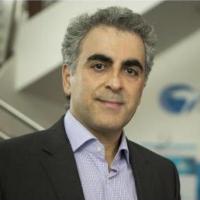SystemX Affiliates: login to view related content.

Pervasive IoT systems are making our lives easier with an enhanced user experience in a variety of widely deployed applications. Microsystems and features of IoT embedded systems and their key technical requirements will be described. Energy efficiency of the future intelligent IoT systems require balancing of computing and communication locally at the IoT node calling upon both Moore’s Law and Shannon’s Law in concert. Innovative technologies to create power-differentiated and cost-effective solutions for future IoT applications will be explained; including specialty SONOS eNVM technology, low-power radios and small form-factor system-in-package & interconnect technologies. We compare them with alternative competitive technologies and explore how participants’ future innovations can be integrated in IoT systems. eNVM technology is critical in enabling energy autonomous IoT systems that rely on intermittent source of energy for program, data, security and advanced networking protocols. Finally, we will demonstrate a low-energy IoT system for precision agriculture that uses solar energy harvesting and conclude by describing a vision of future IoT systems.
Ali received his Ph.D. in Electrical Engineering from Purdue University and has been selected an outstanding distinguished electrical engineering alumni from Purdue University in 2015. Ali has over 20 years of industry experience in enabling strategic and differentiated technologies for a variety of semiconductor and IC applications including low-power and high-performance systems.
Ali is currently a Vice President of R&D and also a Fellow at Cypress Semiconductor. Ali leads the technical staff of R&D at Cypress. Ali is working on developing innovative differentiated technology modules required to enable TAM expansion through new applications for variety of memory solutions for high performance networking, computing, IoT and automotive applications. Ali is also involved in R&D and special assignments from the CEO and the BoD for internal Cypress start-ups and subsidiaries. Recently, Ali delivered an invited talk at IEDM 2016 regarding embedded systems and innovative technologies for IoT applications; toward convergence of low-energy IoT and high-performance automotive requirements.
Prior to Cypress, Ali was a Fellow and Director of Advanced Technology Architecture at GLOBALFOUNDRIES defining FinFET-based 14nm technology architecture to enable launching a variety of SoC products for a broad range of systems and applications. Ali had to work closely with several of influential fabless semiconductor companies to ensure the technology platform will have a wide range of applications and can serve many markets. Ali has described the highlight of the 14nm platform architecture externally in an invited talk and a paper at IEDM 2011.
Ali has also worked at TSMC as a Director of Design and Technology Platforms defining and leading device and circuit co-optimization for the 20nm technology platform and what would come after 20nm technology node i.e. FinFET-based technology solutions. While at TSMC, Ali worked on development of FinFET-based technologies for continued technology scaling. Ali published a widely referenced paper with his TSMC colleagues at IEDM 2010 some of the FinFET development highlights at the time.
Prior to TSMC, Ali worked at Intel Corporation for over 15 years in a variety of roles and in various capacities. Latest while at Intel, Ali served as a principal research scientist of Intel Corporation while working at the Intel Labs under Intel CTO focusing on low-power/high-performance circuit techniques and transistor device structures for future generations of microprocessors. Ali is widely recognized on sources of transistor leakage, low power, body-biasing and variation tolerant circuits in the industry. While at Intel, Ali worked on assignments in technology development, technology certification and qualification, technology transfer, reliability, research, within Intel and working with multi-site cross-functional teams across the globe and also later as a research scientist for Intel with international academia and across industry consortiums on a range of topics. Ali has evaluated commercial viability of various technology modules and emerging devices including a technical framework for assessing Carbon Nanotube Transistors (CNTs) for an electronic switch application while at Intel. One of the last projects that Ali worked on while at Intel was securing Intel’s first DARPA funded project as a Principal Investigator (PI) on STT-RAM memory (Spin Transfer Torque magnetic memory).
Ali has over 40+ patents, over 40+ papers, has received best-paper awards, best-panel awards and has been granted the prestigious Intel Achievement Awards (IAA).
Ali has served in the Technical Program Committees (TPC) of both ISSCC and IEDM in technology directions, emerging applications, device/circuit co-optimization and technology platforms. Some of the highlights of Ali’s featured work with ISSCC was organizing and moderating three key panel discussions. In 2014 ISSCC, Ali organized a CEO and VC panel that key industry leaders discussed and debated their perspectives on the semiconductor industry and the future of disruptive innovation that was memorable, widely attended, well-received, heavily debated, and later widely discussed after the conference while it was covered across the industry, in the IEEE press and various other publications (www.issccpanel.org). In 2013 ISSCC, Ali organized another successful panel on empowering the killer SoC applications of 2020. In this panel, the head of Google glass participated and projected from the glass and described his integrated system. This panel was also well-received and widely covered by the media. And it set the stage for the more ambitious panel in 2014. Ali also organized and won the best panel award from ISSCC in 2015 on “Moore’ Law Challenges below 10nm: Technology, Design and Economic Implications”. Key technologists from Intel, TSMC, Samsung, Qualcomm, Xilinx, and IMEC debated the topic in Feb. of 2015 at San Francisco.
Ali has also previously served on the TPC committees of ISSCC, IEDM, A-SSCC, ISLPED, ISQED and was the general chair of ISLPED. ISLPED is the international low power electronics symposium. Ali has delivered many invited talks in the industry, conferences and at academic forums. Ali is recognized as a technical leader, a visionary innovator and an entrepreneur who has a track record of delivering on promise of a variety of disruptive and differentiated technologies serving various ICs, SoCs and System applications.


